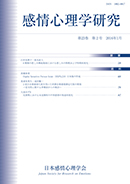All issues

Volume 23 (2015)
- Issue 3 Pages 97-
- Issue 2 Pages 59-
- Issue 1 Pages 1-
- Issue Supplement Page・・・
Volume 23, Issue 3
Displaying 1-3 of 3 articles from this issue
- |<
- <
- 1
- >
- >|
Articles
-
Yuka Inokawa, Masahiro Yamaguchi, Shintaro YukawaArticle type: Article
2016Volume 23Issue 3 Pages 97-104
Published: May 30, 2016
Released on J-STAGE: December 02, 2016
JOURNAL FREE ACCESSThe present study examined the relationship between the secondary emotions caused by suppressing primary emotions (and the “double suppression” of suppressing secondary emotions) and mental health or adjustment. Participants (N=253) completed a questionnaire package containing: (1) items about the tendency to suppress emotions, (2) experiences and frequency of secondary emotions, (3) frequency of double suppression, (4) a scale of overall mental health (GHQ28), and (5) a scale assessing adjustment(measuring one's sense of basic trust). The frequency of secondary emotions caused by suppressing negative emotions, but not the tendency of emotional suppression itself, was associated with mental unhealthiness and maladjustment. The importance of this distinction that mental health and adjustment may be related to the frequency of secondary emotions rather than emotional suppression per se is discussed.View full abstractDownload PDF (373K) -
Ayako Isato, Satoshi MochizukiArticle type: Article
2016Volume 23Issue 3 Pages 105-115
Published: May 30, 2016
Released on J-STAGE: December 02, 2016
JOURNAL FREE ACCESSA wealth of evidence has indicated that an abundance of negative biases and a lack of positive biases in memory could be an important factors in the onset and subsequent maintenance of depression. Moreover, recent studies have suggested that attentional biases influence memory biases and biases in the information input stage might play a key role in causing these biases. Nevertheless, most studies on memory biases have investigated only recall biases, with only a few studies directly examining encoding biases. Therefore the relationship between dysphoria and encoding biases was investigated using the recognition task described by Müller et al. (2009). Results indicated that encoding positive words enhanced encoding preceding and subsequent words in non-dysphoric participants, whereas this was not the case in dysphoric participants. These results suggest that dysphoria is associated with a paucity of encoding information presented temporally close to positive information. It is suggested that future studies should investigate the impact of processing emotional information on processing other types of information in people with depression.View full abstractDownload PDF (409K) -
Tetsuya Fukuda, Masataka HiguchiArticle type: Article
2016Volume 23Issue 3 Pages 116-122
Published: May 30, 2016
Released on J-STAGE: December 02, 2016
JOURNAL FREE ACCESSThis study had two purposes: first, we investigated the effects of observer behavior on feeling of embarrassment of an individual, and second, we explained the process of that effect. Participants read a scenario in which they felt embarrassment in front of a friend and the friend responded with one of four types of behavior (helpfulness, avoidance, being humorous, and other-monitoring.) or did not react at all. Participants were then asked to respond to items describing their feeling of embarrassment (Higuchi, 2000) and causal factors of embarrassment (Higuchi, 2001). To examine whether participants' feeling of embarrassment differed, one-way ANOVA and multiple comparison were conducted. These analyses revealed that “avoidance” behavior heightened feeling of embarrassment compared to “helpfulness” or “being humorous” behavior. Moreover, mediation analyses showed three causal factors of embarrassment (apprehension of social evaluation, disruption of social interaction, and loss of self-esteem) could mediate between avoidance behavior and feeling of embarrassment.View full abstractDownload PDF (307K)
- |<
- <
- 1
- >
- >|